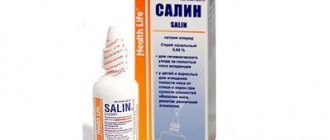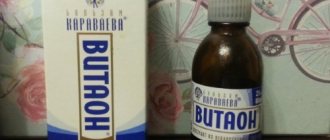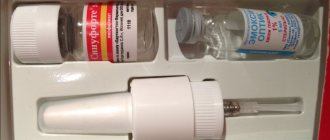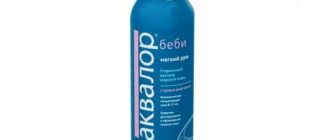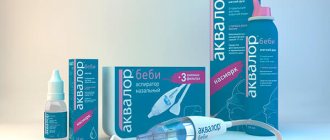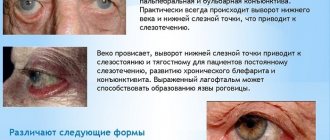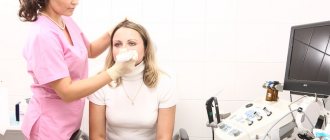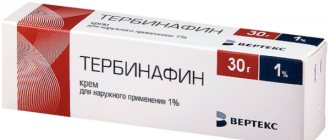Nasal drops Sanorin is a vasoconstrictor drug for topical use in ENT practice. The therapeutic effect is based on one main component, which effectively constricts blood vessels, eliminating nasal congestion and swelling of the nasopharynx, as well as the formation of mucous secretions. The drug is particularly popular among consumers, as confirmed by numerous positive reviews.
Composition, form, packaging of the medicine
Sanorin drops are a clear, slightly viscous transparent liquid. 1 ml of solution contains 0.5 mg of naphazoline nitrate. This active substance provides a therapeutic effect. Additionally, the composition includes the following ingredients:
- orthoboric acid;
- ethylenediamine;
- paraben E218 (preservative);
- purified water.
Sanorin nasal drops are produced with a concentration of the active substance of 0.1 or 0.05%. The medicine is packaged in 10 ml dark glass bottles. The bottle is equipped with a special built-in rubber dropper, which is closed with a special cap. It is packed in card packs, which also contains an instruction sheet. The medicine is produced in the Czech Republic: IVAX Pharmaceuticals sro, Teva Czech Industries sro
How does it affect the body?
Thanks to the key substance - naphazoline nitrate, the medication is able to provide several actions at once to combat nasal congestion and other symptoms of colds. It relieves swelling inside the nasal cavity by constricting blood vessels. The vasoconstrictor effect is due to the work of the active component, namely the stimulation of receptors that secrete adrenaline - Alpha-1 and Alpha-2. These receptors are located in the nose, or rather on the blood vessels inside it. Alpha 1 and Alpha 2 receptors help constrict blood vessels by constricting smooth muscle. This makes the nasal mucosa less swollen. In addition to the main function of the drug, it increases pressure in the arteries, increasing blood flow throughout the body. Vitamins and minerals reach all parts of the body faster, oxygen entering the blood is carried to the brain. Therefore, after taking the medicine, a person feels an increase in energy. The medical product thus combats the lack of nutrients and restores the immune system. But drops or spray alone will not be enough; it will only replenish the energy balance for a short period of time.
Mechanism of action
The active ingredient, naphazoline, is an alpha2-adrenergic agonist that can influence alpha-adrenergic receptors of the sympathetic nervous system. After instillation into the nasal cavity, the medicine has a rapid, pronounced and long-lasting effect on the vessels of the mucous membrane of the nasopharynx and paranasal sinuses. As a result, swelling and hyperemia are reduced, which improves the patency of the nasal passages and facilitates nasal breathing. In addition, the patency of the Eustachian tubes is restored. The drops begin to act 5-10 minutes after instillation. The therapeutic effect lasts 4-6 hours.
No formal studies have been conducted regarding the absorption, distribution, metabolism of droplets in the body and their routes of elimination.
Sanorin during pregnancy: instructions for use in the 1st, 2nd and 3rd trimester
Expectant mothers are periodically bothered by congestion and swelling of the nasal mucosa. The development of deviations is explained by an imbalance of the immune system, as a result - the risk of negative effects of pathogens increases sharply.
Patients are aware that it is recommended to limit the intake of medications while carrying a baby. Does Sanorin fall into the group of safe drugs or is it better to exclude its use in the clinical picture of a pregnant woman?
Therapeutic Description
"Sanorin" is a chemically synthesized medicinal product for topical use in otolaryngology. Belongs to the group of anticongestive drugs, has a pronounced vasoconstrictor effect on the mucous membrane of the ENT organs.
Sold by the manufacturer in three forms: drops, sprays, emulsions for intranasal use.
The basis of the drug is naphazoline nitrate, the concentration of which on the surface of the mucous membrane activates adrenaline receptors. The body's response is the production of norepinephrine, which causes vasoconstriction.
Excipients include boric acid, liquid paraffin, alcohol, and purified water.
Advice! The use of vasoconstrictor drops is recommended in cases where nasal congestion cannot be tolerated. If positive dynamics appear, you should immediately limit contact with medications.
"Sanorin" will be ineffective in the treatment of diseases of viral etiology
The spectrum of action of Sanorin is not limited to indications for use in rhinitis. The drug is effective in diagnosing the following abnormalities:
- inflammation of the paranasal sinuses;
- nosebleeds;
- seasonal conjunctivitis;
- damage to the cavities of the respiratory organ of a bacterial and allergic nature (sinusitis);
- pharyngitis;
- Eustachitis.
The medicinal product does not have therapeutic properties; its administration is aimed at normalizing the following indicators:
- restoration of the respiratory process;
- relief of painful sensations;
- relieving swelling of the mucous membrane;
- reduction of discharge.
Important! In case of overdose, a paradoxical effect may develop: swelling of the nasal sinuses becomes more pronounced.
The effectiveness of the drug wears off within 4-6 hours. Regular use of nasal fluid provokes the development of tachyphylaxis (addiction to medications), so the course of treatment is limited to 5 days, ideally 3 days.
"Sanorin" during pregnancy: instructions for use
It is not recommended for expectant mothers to self-medicate during the 1st, 2nd, or 3rd trimester. When the first symptoms of malaise or deterioration in health appear, it is rational to seek qualified medical help. A competent therapeutic regimen is based on examination, identifying the causes that provoked the development of the disease.
Abundant mucous discharge and an increase in the inner lining of the nose can be a natural reaction of the body to the actions of opportunistic microorganisms or signal serious pathological disorders of organs and their systems.
The drug is present in the therapeutic regimen of a pregnant woman in case of urgent need, when natural medicines have not brought positive dynamics.
The use of sprays allows you to quickly relieve symptoms of inflammation of the mucous membrane at a lower dosage compared to nasal drops
"Sanorin" is not a prohibited drug during pregnancy, however, it is recommended to use this powerful drug with caution (especially in the 1st and 3rd trimester) due to the possibility of the following side effects:
- increased blood pressure;
- dry nasal mucosa;
- increased heart rate;
- attacks of vomiting, nausea;
- neurotic reactions;
- pain in the head and neck;
- tremor of the upper extremities.
Patients with thyroid diseases, diabetes mellitus, glaucoma, high intraocular and intracranial pressure are at risk.
The public is not provided with accurate clinical data on the effects of active substances on the fetus, so it is impossible to predict how the medicine will affect the development of the embryo.
What is the risk of using the drug, according to the instructions for use of “Sanorin” during pregnancy:
- 1st trimester. Medication intake is kept to a minimum, because active substances can provoke vasospasm, which increases the likelihood of miscarriage;
- 2nd trimester. Cautious use of Sanorin is allowed under the condition of urgent need. It is recommended to treat the nasal passages with cotton swabs, which reduces the load on the mucous membrane and reduces the risk of overdose;
- 3rd trimester. Due to the high absorption of active substances with the blood and lymphatic system, taking Sanorin is not advisable. The drug is contraindicated during breastfeeding.
The use of Sanorin with eucalyptus during pregnancy does not exclude the possibility of individual intolerance to the active components or the development of an allergic reaction, because The composition includes powerful allergens in the form of essential oil antigens.
Sanorin is not prescribed to children in the first two years of life. The manufacturer's instructions allow the use of the medicine from the age of 15
Interesting! Eucalyptus oil has an antiseptic, bactericidal, analgesic effect, therefore it is effectively used in the treatment of respiratory diseases.
How to use a vasoconstrictor correctly
The importance of information for pregnant women is the limited period of use of the pharmaceutical product. The frequency of daily irrigation of the nasal cavities should not exceed 4 times.
Impact on the mucous membrane requires a sequence of actions:
- Rinsing the nasal passages with a saline solution or a special agent to reduce the concentration of mucus and improve the adhesion of the active components to the inner lining of the nose.
- The temperature of the liquid should be optimal for comfortable use. If the drops are stored in the refrigerator, it is recommended to warm the bottle with the warmth of your palms or place it in warm water.
- To further moisten the surface when administering a medicinal substance, it is necessary to take a horizontal position or tilt your head back; when irrigating the left nostril, turn the neck to the left, and the right - to the right. Pregnant women are prescribed 1-2 drops in each nasal opening 3 times a day.
- After instillation, press the nostril against the nasal septum for 10-15 seconds to prevent concentration of the medicine in the nasopharynx.
You can purchase the drug in specialized medical institutions without a prescription. The price range varies from 140 rubles per drop, the cost of sprays starts from 238 rubles.
Before using Sanorin during pregnancy, be sure to consult your doctor. It is possible that the pathology can be stopped with more gentle natural-based drugs, such as Aqualor, Pinosol.
A good effect is obtained by daily toileting the nose with saline solution or “Aquamaris”, inhalation, then the need to use vasoconstrictor drugs will disappear on its own.
gorlonos.com
Main indications
Diseases accompanied by swelling of the nasopharynx and excessive production of nasal mucus are the main indications for use. It is advisable to use Sanorin in the following cases:
- acute sinusitis - an otorhinolaryngological disease in which the inflammatory process occurs in the paranasal sinuses (drops here);
- allergic rhinitis - a runny nose that occurs against the background of an allergic reaction of the body;
- acute nasopharyngitis - inflammation of the mucous membrane of the nasopharynx, most often of infectious etiology;
- Otitis media is an inflammatory process that develops in the middle ear (drops here);
- eustachitis - inflammation of the mucous membrane of the auditory (Eustachian) tube and tympanic cavity;
- laryngitis is an inflammation of the mucous membranes of the larynx, usually associated with a cold or infectious diseases such as measles, scarlet fever, whooping cough.
Read more Isofra nasal drops - instructions, reviews
The drug is used in preparation and during therapeutic or diagnostic procedures on the nasal cavity. If necessary, use to quickly stop nosebleeds.
Reviews from doctors about Sanorin
| Rating 5.0 / 5 |
| Efficiency |
| Price quality |
| Side effects |
"Sanorin" is a good and effective drug for nasal congestion (swelling of the mucous membrane), rhinorrhea and cold symptoms associated with nasal breathing. Fast and fairly reliable effect, long lasting. Basically, I prescribe it for older children and without a history of allergic reactions.
Excellent price/quality ratio. I recommend.
| Rating 5.0 / 5 |
| Efficiency |
| Price quality |
| Side effects |
An excellent vasoconstrictor drug, used for rhinitis and colds. The effect of the drug is long-lasting and rapid. The price corresponds to the quality of the drug. I prescribe it to patients for no more than 7-10 days. It must be used carefully; it cannot be used for a long time. Addictive. Before use, consultation with a general practitioner or ENT doctor is necessary.
| Rating 5.0 / 5 |
| Efficiency |
| Price quality |
| Side effects |
A good vasoconstrictor, helps with a runny nose during a cold. The effect of the drug occurs quickly and lasts for a long time. Lasts for a long time. The price corresponds to the quality, it is effective.
Before use, you need to consult an ENT doctor; long-term use is addictive. Carefully.
Method of application and dosage
According to the instructions for use of Sanorin drops, they are used intranasally in accordance with indications and contraindications. Standard dosage regimen:
- for adults and children over 15 years of age (Sanorin 0.1%) – 1-3 drops in each nasal passage up to 4 times a day;
- for children from 2 to 5 years (Sanorin 0.05%) – 1 drop up to 3 times a day;
- for children from 5 to 15 years (Sanorin 0.05%) – 2 drops up to 3 times a day.
The interval between instillations should be at least 4 hours. The course of therapy for adults should not exceed a week, for children - no more than 4 days. Subsequent use of the drug is ineffective, and the risk of developing undesirable consequences increases significantly.
Patient reviews of Sanorin
I always keep the spray in my first aid kit. As soon as a runny nose starts, I immediately start spraying it. Its effect is long-lasting, 3 procedures per day are enough for me. It’s convenient, a couple of injections of Sanorin, and your nose can breathe freely.
I really like the Sanorin spray for its affordable price and quick action. Another big plus is that it does not flow down the throat, and therefore there is no that terrible aftertaste of the medicine after use. In addition, the spray does not irritate the mucous membrane, does not dry it out and, when used correctly, is not addictive.
Sanorin spray is a good and relatively inexpensive tool in the fight against nasal swelling (acute runny nose, congestion, etc.). Unlike many, this spray is not addictive. Constricts blood vessels, which allows you to breathe freely again, without flowing down the back wall of the nasopharynx. For me this is a big plus. In general, Sanorin is based on eucalyptus oil, so there is no dryness in the nose from using the spray. When I'm sick, I use it 3-4 times a day, it starts working in the first 10 minutes, and the effect lasts for almost half a day. Usually within a few days the swelling has completely disappeared and I can breathe freely again.
I always have Sanorin spray in my first aid kit. This is my main assistant in treating a runny nose. As soon as I feel my nose running or start sniffling, I immediately spray this spray. It gently sprays the substances, the swelling subsides, so it immediately becomes easier to breathe. The shitiness goes away. So you spray it 3-4 times a day, and the next day your runny nose is less. Usually 2-4 days are enough for me to completely get rid of snot.
Normal spray, worth the money. I bought several types of sprays, both cheaper and more expensive, and it turns out that “Sanorin” has the longest validity period in terms of the fact that you don’t need to drip it into your nose every half hour, a spritz twice a day is enough to forget about a runny nose during a cold. This helps a lot when you need to go somewhere, but want to avoid the sidelong glances of others. Otherwise, I know these women who grumble that I’m spreading bacilli. If I had the flu, I would rest at home, but colds are not contagious.
I hate a runny nose, while I was sitting at work, I rubbed my entire nose with paper tissues until it was red. Well, this is how I’ll sit like this until the end of the working day, it’s a shame to work with people like this. During my lunch break I went to the pharmacy and bought myself a spray for a runny nose, called “Sanorin”. The name is familiar, I remember from childhood; we always had a bottle with that name in our medicine cabinet. But it was glass and had a dropper nose, and the Sanorin spray was in a plastic bottle and the spray was long, with two protrusions, so that it was convenient to press with one hand. “Sanorin” works well, it thoroughly cleared my nose, until the evening, I think, my nose will remain free, I’ll take more at night. And what can you do about the red nose? You’ll have to sit out the day like this. There is aloe gel at home, you need to smear it on your nose where you rubbed it.
I was sick for probably a month. It turned out to be a severe cold - to say nothing. I alternately sneezed and sniffled, at work I interact with people, I can’t sell anything in this state. The doctor came across a good one, prescribed Sanorin spray and prescribed spraying 4 times a day for a week. And you know, I stopped sniffling already on the fourth day. The product quickly relieved congestion and irritation, so I looked better the next day. What I especially liked about it was the lack of smell; it was important to me that I didn’t smell like medicine.
I remember in childhood all sorts of folk remedies helped with a runny nose, but now with my immunity only the pharmacy and doctors, I can’t do without them. And then autumn began - I managed to get sick. The doctor prescribed me Sanorin spray and prescribed spraying 3 times for 3 days. I generally don’t like sprays, they irritate me, but this one surprisingly suits me. It relieves inflammation and congestion well. A pleasant bonus was the lack of smell and taste of the medicine, otherwise I don’t like these herbal and pharmaceutical smells.
I have an inherited “gift” from my dad - allergic rhinitis. It seems to me that it would have been cheaper to buy a gas mask or spacesuit a long time ago, so as not to feel how the people around me were showered with perfume from head to toe. It especially creeps me out when the perfume contains lily of the valley - it’s brutal, it’s like “good luck!”, the inside of my nose swells in seconds. It is for this reason that I don’t go down to the subway, and I don’t go out into the street without antihistamine tablets and Sanorin cold spray. It is easy to use and does not cause me an additional allergic reaction; there are simply no unnecessary additives. And “Sanorin” copes well with swelling in the nose.
By the way, Sanorin spray always helps me out. I am allergic to many different substances - milk and dust for sure. It happens that I’m going somewhere on a business trip and an attack begins, so I always have it in my car, I pop it a couple of times and breathe all day. It has neither smell nor taste, which is extremely important for me, I can’t stand it when there is bitterness in my mouth, and with my illness it’s generally better to immediately exclude any irritants.
“Sanorin” is perhaps the best remedy for chronic runny nose; thanks to its effective action, breathing has become much easier. I have been using Sanorin for more than two and a half years, during all that time it has always helped me out. In Moscow pharmacies, Sanorin can be purchased at a very reasonable price. I recommend using it if you have a really bad cold.
I had a chronic runny nose, and without drops I could not sleep. It happened that I woke up at night because it was difficult to breathe, and if there were no nasal drops at hand, it was very bad. The problem is rather psychological, there is an attachment to nasal drops and addiction. Also, the effect of the drops is also different. I bought these nasal drops as a more budget-friendly analogue of Noxprey, to which I was extremely addicted, and as an effective remedy, according to reviews from people like me. I don’t know what worked, but over time, the dependence on the drops began to disappear, and I woke up less and less at night from discomfort associated with breathing. Most likely it’s a matter of composition; it suited me and, importantly, did not cause addiction, did not stop the problem, but rather eliminated it, slowly but surely. Now I don't buy drops at all, since they are not necessary.
“Sanorin” is a good drug, and most importantly, it works. A runny nose is a problem for many people, including mine. With the arrival of spring, it usually comes out somewhere and that’s it, with a runny nose, but there is a faithful and reliable “friend” who will always come to the rescue. The main thing is not to overdo it with instillation, otherwise problems may begin (drying out of the nasal mucosa, and a feeling of nasal congestion may also appear).
Every winter, a runny nose is my faithful friend. I tried a bunch of drops, and now I’ve settled on Sanorin. Affordable price, despite the growing popularity of these drops. Drops quickly help to cope with a runny nose: in 2-3 days. The most important thing is not to overuse, use strictly according to the instructions, and do not spray into the nose every 5 minutes, otherwise an unpleasant sensation similar to dryness may occur, and the drops may no longer work if used frequently.
I liked Sanorin. It acts softly and quite quickly. It helps me with acute spring allergies and colds, when my nose is very, very stuffy. The spray makes the process of use much easier! The main thing is to avoid overdose. Once I overdid it and doubled the dose. The result is a very unpleasant feeling of dryness in the nose. My daughter’s herbal drops saved her.
A good drug, available in the form of a solution, drop, or spray. Everyone can choose the appropriate option for themselves. I felt the result from the first use, and it lasted for a long time. The most important thing is that this drug does not cause dryness in the sinuses and addiction, which I have encountered more than once, so I carefully choose the drug. Moreover, I couldn’t help but be pleased with the price of this medicine, because it is more affordable and the quality is excellent.
I would like to start by saying that for me these are the best drops for a runny nose! I tried many similar products, but this helped me quickly, efficiently and for a long time. I felt improvements from the first use, my nose cleared, and it immediately became easy to breathe. The release form is convenient, the pipette is soft, the drops are easy to squeeze out. The only thing is that I prefer the spray, because when they get into the nose, these drops immediately end up in the mouth, the taste is unpleasant. However, their effectiveness does not decrease at all. After two days of taking these drops, I forgot about my runny nose and feel great! And the price is very reasonable and will not negatively affect the family budget.
Contraindications
Sanorin nasal drops should absolutely not be used for the following conditions:
- high sensitivity to any component of the drops;
- rhinitis of atrophic and chronic nature;
- persistent increase in blood pressure (hypertension);
- severe atherosclerosis;
- rapid heartbeat (tachycardia);
- angle-closure glaucoma;
- severe forms of eye pathologies;
- diabetes;
- persistent increase in the number of thyroid hormones;
- children under 2 years of age.
Relative contraindications:
- coronary heart disease (CHD);
- benign growth (hyperplasia) of the prostate gland;
- benign tumor with a predominant localization in the adrenal medulla (pheochromocytoma).
In all of these cases, Sanorin nasal drops are used carefully, under the supervision of the attending physician.
There is no information about the penetration of the active substance through the placental barrier. Therefore, the use of Sanorin during pregnancy and breastfeeding is not recommended. Drops should be used strictly as prescribed by a doctor when there are no alternative treatment methods.
What nasal drops can be used for breastfeeding mothers?
A runny nose is not an independent disease, as many people believe, but an important symptom indicating the presence of a cold. It is important for a young mother to know what rhinitis is, what nasal drops can be used during breastfeeding (BF) and preventive measures in this situation.
Symptoms of a runny nose and first steps
A manifestation of inflammation of the nasal mucosa is considered to be heavy discharge, which is accompanied by difficulty breathing through the nose (nasal congestion), sneezing, and redness.
Additional signs may include headache, nasal voice and general weakness. The cause of a runny nose is an infection of viral etiology, the causative agents of which are rhinoviruses, coronaviruses, picornaviruses, etc.
They “settle” on the mucous membrane of the nasal sinuses.
To prevent complications, the treatment of respiratory infections must be approached comprehensively. This is especially true for a nursing mother.
A woman’s body is weakened due to pregnancy and childbirth, and caring for an infant requires a lot of effort at any time of the day. Stress, lack of sleep and a weak immune system contribute to the development of pathogenic microorganisms.
When taking measures to protect the health of the baby and mother, it is important to approach this problem with special attention.
Recommendations for nursing mothers:
- bed rest is indicated,
- Drink plenty of warm drinks to remove toxins from the body,
- you should increase your sleep time,
- It is recommended to include fruits and vegetables rich in vitamins in the diet,
- Wear a medical mask while breastfeeding.
Recommendations for the child:
- spend more time outdoors,
- allocate a separate room for the baby to reduce his contact with infectious agents.
Recommendations regarding the premises:
- frequent ventilation,
- wet cleaning at least once a day,
- The optimal room temperature is 20 degrees Celsius.
Pathogenic microorganisms thrive in a warm, dry room without air movement and, conversely, die in a humid environment with ventilation and cool air temperatures.
Nasal drops approved for breastfeeding
It is important to carefully consider the choice of nasal drops when breastfeeding. Many medications cannot be taken while breastfeeding; there is a risk of the baby developing an allergic reaction to the treatment of the mother’s cold or undesirable effects from the treatment.
Before starting treatment, you should definitely consult with your doctor; he will be able to select safe drops for treatment during breastfeeding.
In modern pharmaceuticals there are more than 10 different drops for the treatment of a runny nose, but only a few of them are allowed to be used during breastfeeding. Cold drops used to treat rhinitis are divided into several types:
- drops based on sea water,
- vasoconstrictors (adrenergic agonists),
- antiallergic drops,
- antiseptic and antibacterial agents,
- homeopathic drops.
Nasal drops based on sea water
Salt preparations are considered the safest for treating a runny nose. Their safety lies in simple, but at the same time, very effective components, sea water purified from impurities, which contains useful minerals and trace elements.
They are effective in the treatment of rhinitis of almost any nature, including allergic and infectious rhinitis. Sea water relieves swelling in the nose, has an anti-inflammatory, wound-healing and antiseptic effect.
Some of the most famous products based on sea water include:
Preparations Photo Price
| Dolphin | From 290 rub. |
| Aquamaris | From 170 rub. |
| No-Sol | Check |
| Aqualor | From 360 rub. |
| Morenasal | From 265 rub. |
| Physiometer | From 424 rub. |
Vasoconstrictor drops
This group of drugs quickly relieves swelling of the nasal mucosa and restores normal airway patency. Drops should be taken with caution, as they can have a systemic effect on the body of the mother and baby. Manifestations of the systemic effect of the drug will be cardiac dysfunction, nausea, and dizziness.
When prescribing these medications, it is recommended to start with small doses, and if there are no side effects, use the prescribed amount of the drug. To prevent unwanted effects, you should give preference to drops that have a minimum of side effects.
The following medications can be recommended for nursing mothers:
Drug Photo Price
| Otrivin | From 180 rub. |
| Nazivin | From 180 rub. |
| Rhinorus | From 77 rub. |
| Knoxprey | From 110 rub. |
| Rhinonorm | From 73 rub. |
| Nazol-Baby | Check |
| Indanazoline | Check |
Do not forget that drugs in this group can be addictive. Nursing mothers can take them no more than 3 times a day and no more than 3-5 days in a row. If vasoconstrictor drops are used irrationally, complications may occur in the form of degenerative changes in the nasal mucosa and drug-induced rhinitis.
Antiallergic drugs
Nasal antihistamines relieve an attack of allergic rhinitis by blocking the release of inflammatory mediators from mast cells that induce upper airway obstruction. When breastfeeding, it is recommended to use the following drops:
- "Renitek"
- "Sanorin-Analergin"
- "Antazoline-Naphazoline"
- "Nazaval."
Preparations Photo Price
| Sanorin-Analergin | From 79 rub. |
| Nazaval | From 405 rub. |
| Renitek | from 87 rub. |
| Naphazoline | specify |
A special feature of the drug “Nazaval” is that it forms a film on the surface of the mucous membrane that protects against the penetration of allergens. It can be used for seasonal allergies during breastfeeding.
Antiseptic and antibacterial drops
One of the complications of ARVI can be bacterial rhinitis. The reason is irrational treatment of viral infection. Signs of bacterial rhinitis include:
- yellow-green viscous nasal discharge,
- swelling of the nasopharynx,
- temperature increase,
- muscle pain.
If pathogenic microflora is not killed in a timely manner, sinusitis, sphenoiditis, and bacterial nasopharyngitis may develop. Among the antibacterial and antiseptic agents, nursing mothers can use the following drugs:
Preparations Photo Price
| Bioparox | Check |
| Miramistin | From 240 rub. |
| Polydexa | From 280 rub. |
| Octenisept | From 508 rub. |
The course of therapy with antibacterial drops is at least 7 days. Premature refusal of their use will entail the development of a resistant strain of microorganisms to the active substance.
During treatment with antibiotics, you should stop breastfeeding due to the risk of developing dysbacteriosis. Continue to express and pour out the milk, and transfer the baby to formula feeding during this period. The choice of formula must be discussed with your local pediatrician.
Homeopathic drops
Recently, the media have often stated the exceptional effectiveness of homeopathic medicines, including in the treatment of the common cold.
The amount of active substance in these drops is so small that it has virtually no effect on the body. They can be used during pregnancy, breastfeeding and in combination with other drugs.
Homeopathic medicines that are used for a runny nose include:
Preparations Photo Price
| Delufen | Check |
| Edas-131 | From 150 rub. |
| Euphorbium Compositum | From 470 rub. |
| Rinildix | Check |
Folk remedies for the treatment of runny nose
The main method of dealing with a runny nose for a nursing mother is inhalation. For it you can use essential oils of eucalyptus, menthol, pine buds, oregano. Menthol essential oil can be used intranasally, instilling 2-3 drops.
To relieve swelling of the nasal mucosa, you can use a heated bag of salt. But it is strictly prohibited when a bacterial infection occurs; this threatens the spread of the disease and the development of complications.
As an alternative to seawater-based preparations, you can use a homemade saline solution. To do this, you need to dilute 1 teaspoon of table salt in a liter of warm boiled water.
What methods should not be used when breastfeeding
It is forbidden to instill, rinse the nasal passages or simply wipe the nose of both mother and child with breast milk. It has been proven that warm breast milk is a favorable environment for the cultivation of pathogens. Using breast milk for a runny nose can seriously aggravate the course of the disease and cause complications.
Prevention of a runny nose
To prevent the development of rhinitis in a nursing mother, experts recommend adhering to the following simple rules:
- Avoid hypothermia and drafts. They help weaken the immune system.
- Reduce travel by public transport as much as possible, especially during seasonal viral epidemics.
- Try to avoid communicating with coughing and sneezing people indoors.
- Follow the rules of a healthy diet, eat fresh fruits and vegetables rich in vitamins.
- Play sports and, if possible, exercise. This will strengthen the immune system.
- Walks in the fresh air at least 2 times a day. When walking, dress according to the season and weather.
And when caring for a sick person or a nursing mother, you need to wear a medical mask or gauze bandage, ventilate the room every 2 hours, humidify the air, and wet clean the room at least once a day.
Among the means of prevention, you can focus on medications for correcting and modeling immunity during an epidemic of influenza and ARVI. Here are a few of these medicines:
- "Vitrum Prenatal"
- "Pregnavit"
- “Mom saves”
- "Alphabet",
- "Elevit pronatal" and others.
If you are taken by surprise by a cold, it is recommended to consult a specialist as soon as possible. He will be able to prescribe individual treatment that will help with this disease.
Side effects, overdose
At recommended doses, the drug is usually well tolerated. In rare cases, when a person is intolerant to the components of the drug, a burning sensation and dryness in the nose may occur. Nausea, increased blood pressure, rapid heartbeat, insomnia, skin rash, irritability, increased intraocular pressure are signs that occur when the dosage is exceeded.
Read more Nasal drops Interferon - instructions for use
Overdose is possible if the medicinal solution is swallowed. This can cause depression of the central nervous system, the manifestations of which are drowsiness, decreased body temperature, increased sweating, slowed heart rate, increased or decreased blood pressure, and very rarely, coma. Treatment is symptomatic, aimed at relieving unpleasant symptoms.
Sanorin for children during breastfeeding
No one is immune from colds.
Especially a woman who has just carried and given birth to a child. After all, the body directed all its forces towards bearing the fetus, recovering from childbirth and maintaining lactation. It’s no wonder that right now there is such a high probability of catching a cold, although there is absolutely no energy or time for this.
How to help a nursing mother? What nasal drops can be used during breastfeeding? What composition of drops is considered the safest for a child?
Most often, nursing mothers are plagued by common seasonal viral diseases. Their main symptoms are:
- Increased body temperature.
- Cough.
- A sore throat.
- Runny nose.
But it would still be a good idea to consult a doctor to rule out another nature of the disease (for example, bacterial). After all, now a newborn baby directly depends on the health of the mother. Everyone knows that most children are immune to many diseases for the first six months or even the entire period of breastfeeding, but no one can be one hundred percent insured.
It happens that, despite a strict diet and serious food restrictions, a runny nose in a nursing mother causes an allergic reaction. In this case, after an appropriate examination, the doctor will definitely select medications that will not harm the baby.
As a doctor speaking to the people on behalf of civilized medicine, Komarovsky categorically does not recommend immediately using nasal drops during breastfeeding.
He advises at the first signs of infection to lie down, dress warmly and create the most comfortable conditions for recovery: cool air and almost one hundred percent humidity.
If you follow these recommendations, the doctor promises that nasal drops during breastfeeding, if the runny nose is not complicated, will not be needed and the cold will go away on its own in 3-7 days.
As an additional treatment, Evgeniy Olegovich prescribes to his patients:
- Drink plenty of warm drinks.
- Diet.
- Drops of saline solution into the nose (salt water solution).
- Regular ventilation of apartment premises.
The doctor reminds that to protect the family and child from infection, it is useful to use gauze masks (which must be changed every two to three hours). It also reminds that folk remedies such as honey, lemon, raspberries and garlic not only do not bring any scientifically proven benefits in the fight against infection, but can also be dangerous for an infant.
It is worth noting that the use of any drug during breastfeeding, even after consulting a doctor, should be started gradually and with small doses. This will determine the presence of possible allergic reactions in the baby.
The safest and even healthiest are drops and sprays based on water and sea salt. They perfectly moisturize the mucous membrane and can be used during pregnancy, breastfeeding, and even in children from the first weeks of life.
Oil drops for a runny nose are relatively safe. During lactation, they usually do not cause allergic reactions due to herbal components (Vitaon, Pinosol and others). They have a good antimicrobial and anti-inflammatory effect.
To relieve swelling from the nasal mucosa and quickly relieve symptoms, vasoconstrictor nasal drops (during breastfeeding) containing xylometazoline are usually prescribed.
When breastfeeding, doctors do not recommend using them for more than three to five days. It is also advisable for the mother to use children's drops, since they contain a much lower dosage of the drug.
You can try to do without vasoconstrictor drugs altogether or use them only before bed.
There is such a drug as “Derinat” (nasal drops). They are absolutely harmless during breastfeeding. It is recommended to drip it even for prevention. Based on reviews, one can judge that these drops are often prescribed even to infants if someone in the family gets sick.
Officially approved nasal drops during breastfeeding:
- “Aquamaris”, “Physiomer” (contains water and salt).
- "Derinat" (active ingredient - sodium deoxyribonucleate).
- "Pinosol", "Vitaon", "Delufen" (oil-based).
- "Euphorbium Compositum" (homeopathic drops).
- “Nazivin”, “Tizin”, “Nazolin”, “Naphthyzin” (contains xylometazoline).
Doctors strictly prohibit instilling, rinsing, or even simply lubricating the nose with breast milk. It has been scientifically proven that sweet, warm milk creates a favorable environment for the proliferation of bacteria and viruses. So such a medicine will not only not cure, but will also seriously aggravate the situation.
Very often, homeopathic medicines are recommended as a powerful weapon against all adversities at any age and position. Proponents of such treatment shout at every step about the dangers of “chemical” drugs and promote their methods.
It is not surprising that homeopathy cannot cause any harm. The famous “peas” and “droplets” contain such a tiny amount of active substance that the body is simply unable to notice it.
So you can actually use such medications even without a doctor, because all their benefit lies in the placebo effect.
Therefore, you can very often hear reviews that homeopathy cures everything, because if a person really believes that this is a medicine, then with a high degree of probability he will recover.
Let's start with the fact that antibiotics are never taken just because of a runny nose. There is always a serious reason for taking such a medicine and a prescription from the attending physician.
If it has already happened that the usual runny nose has already started, a severe cough has appeared, the temperature does not subside, but rises higher, the state of health worsens and pain of various localizations appears, you simply cannot do without a trip to the doctor.
A doctor may prescribe antibiotics to a nursing mother if the benefits outweigh the risks. But you should remember: feeding will have to be stopped temporarily (until recovery), and the milk will have to be expressed and poured out (so that it does not burn out, and later you can resume feeding the baby). It’s okay that the child will have to spend a couple of weeks on formula, the main thing is that the mother gets better soon.
Experienced mothers say that if there are no other symptoms, breastfeeding is not only possible, but also necessary to continue.
When a mother is sick, the baby receives antibodies with milk, which the adult body begins to produce in the first hours of illness. Thus, according to the law of nature, the baby cannot become infected.
But still, doctors recommend giving up kissing during the period of illness and, of course, not coughing on the child or blowing your nose if he is nearby.
- It is advisable that the child can at least sleep in a non-infected environment - try to provide the baby with a separate room during the period of mother’s illness.
- Ask dad or grandma to walk more with the child.
- Carry out wet cleaning of the apartment at least once a day.
- Ventilate the apartment every two hours.
- Try to feed your baby wearing a gauze bandage.
- Continue breastfeeding - this is the best support for your baby's immune system.
Are there all-natural nasal drops (for breastfeeding)? Traditional medicine recommends how to treat a runny nose in this case:
- Rinse the nose with a salt solution. This same method, by the way, is recommended by traditional medicine (salt is diluted in warm boiled water in a ratio of approximately 1 to 30).
- Nasal drops from aloe/kalanchoe juice (aloe leaf is cut and squeezed out, diluted with water and dropped into the nose).
- Drops of beet juice (squeeze the juice out of raw beets and drop 2-3 drops into your nose).
- Rinse with chamomile decoction and drop it into the nose.
A tablespoon of dried chamomile flowers is poured into a glass of boiling water and left for several hours. The resulting solution is filtered and instilled into the nose. The infusion can also be diluted with water and used to rinse the nasal passages and throat.
- Herbal inhalations. Can only be used if there is no fever.
Reviews from experienced mothers say that it is not worth using nasal drops (during breastfeeding), often recommended by traditional healers, made from garlic, as well as products based on raspberries, lemon, onions and honey. They often cause severe allergies in children.
In order not to use medications to combat rhinitis, it is worth thinking about prevention in advance. This will help:
- Walks (at least twice a day). This will be useful for both mother and baby.
- Ventilation of the apartment.
- Maintaining the air temperature in the apartment around 20 degrees Celsius.
- Using a humidifier.
- Dress according to the season and weather.
- Healthy eating.
- Sports activities.
- Hardening.
- Use of protective ointments and masks (in public places, especially during epidemics).
source
For acute rhinitis, sinusitis, eustachitis, laryngitis, to facilitate rhinoscopy for adults, children and adolescents over 15 years of age - 1-3 drops of nasal drops 0.1% or 1-3 doses of nasal spray in each nasal passage 3-4; nasal drops 0.1% in the form of an emulsion, 1-3 drops are prescribed in each nasal passage 2-3
Children over 2 years old - 1-2 drops of nasal drops 0.05% in each nasal passage 2-3 with an interval of at least 4 hours.
Use for a short time: in adults - no more than 1 week, in children - no more than 3 days. If nasal breathing becomes easier, the use of Sanorin can be stopped earlier. Repeated use of the drug is possible after a few days.
In case of nosebleeds, you can place a cotton swab moistened with a 0.05% solution of Sanorin into the nasal passage.
As an additional remedy in the treatment of conjunctivitis of bacterial origin, nasal drops 0.05%, 1-2 drops 3-4, are instilled into the conjunctival sac
Nasal drops in the form of an emulsion must be shaken before use. An open bottle of the drug should be used within 4 weeks.
When using the spray for the first time, it is recommended to press the dispensing device several times until a compact cloud of aerosol appears.
Before direct use, remove the protective cap, keep the bottle with the drug in an upright position, insert the end part of the dosing device into the nasal passage, then quickly and sharply press the applicator.
Immediately after injection, it is recommended to take a light breath through your nose. After using the drug, close the applicator with the protective cap.
From the digestive system: nausea.
From the cardiovascular system: tachycardia, increased blood pressure.
From the central nervous system: headache, irritability.
Allergic reactions: rash.
Local reactions: reactive hyperemia, swelling of the nasal mucosa; when used for more than 1 week - irritation, in some cases - swelling of the nasal mucosa.
Contraindications to the use of the drug SANORIN
- simultaneous use of MAO inhibitors and a period of up to 14 days after the end of their use;
- children under 2 years of age (nasal drops 0.05%);
- children under 15 years of age (nasal drops 0.1% in the form of solution and emulsion, nasal spray);
- hypersensitivity to the components of the drug.
Use of the drug SANORIN during pregnancy and breastfeeding
Data on the safety of the drug during pregnancy and lactation (breastfeeding) are not provided.
With long-term use, the severity of the vasoconstrictor effect gradually decreases (the phenomenon of tachyphylaxis), and therefore it is recommended to take a break for several days after 5-7 days of use in adults and after 3 days of use in children.
The drug may have a resorptive effect.
The doctor determines the need to use Sanorin with other medications individually.
Symptoms: prolonged or frequent administration of the drug Sanorin into the nasal cavity can cause swelling of the nasal mucosa and a feeling of congestion.
The danger of overdose (especially if swallowed) of the drug Sanorin occurs in young children and can cause depression of the central nervous system, manifestations of which are drowsiness, decreased body temperature, increased sweating, slowed heart rate, increased blood pressure or its subsequent decrease, and extremely rarely - coma.
Treatment: discontinuation of the drug, symptomatic therapy.
Concomitant use with MAO inhibitors and for a period of up to 14 days after the end of their use increases the risk of developing severe arterial hypertension (release of deposited catecholamines under the influence of naphazoline). Slows down the absorption of local anesthetics.
Sanorin is a topical medicinal product, produced in the form of a solution, drop, intranasal spray and drop with eucalyptus oil and containing the active substance - naphazoline, which belongs to the group of alpha-adrenergic agonists and is therefore an anticongestive agent with a vasoconstrictor mechanism actions.
Sanorin has a rapid, pronounced and fairly long-lasting vasoconstrictor (vasoconstrictor) effect on the vessels of the mucous membranes of the nasal cavity and paranasal sinuses and, therefore, reducing the inflammatory process in the nasal cavity, eustachian tube and, to a lesser extent, the paranasal sinuses.
Its anti-congestive effect is based on the impact and stimulation of alpha-adenoceptors as a result, and as a result, reducing swelling and hyperemia of the mucous membranes, and due to a decrease in blood flow to the venous sinuses of the nasal cavity, there is a decrease in mucus production. This drug also helps to expand and open the excretory ducts of the Eustachian tinder and paranasal sinuses, which makes it possible to improve the outflow of mucus during sinusitis and eustachitis, and also prevents the deposition of bacteria on the mucous membranes of the nasopharynx and nasal cavity.
Source: https://str-control.ru/preparaty-dlya-lecheniya-nasmorka/sanorin-detskiy-pri-grudnom-vskarmlivanii/
Special instructions for using Sanorin
Special recommendations for the nasal remedy are as follows:
- Long-term use of drops can provoke atrophy of the nasal mucous membranes and chronic obstruction of the nasal passages.
- Before using the drops, you should clear your nasal passages of accumulated mucus and crusts.
- The dose missed during the day does not need to be doubled for subsequent use.
- The medicine does not affect the ability to drive or engage in potentially hazardous activities.
- Sanorin slows down the absorption of local agents with an anesthetic effect, which leads to an increase in the duration of their action.
The drug is not recommended to be combined with tricyclic antidepressants and monoamine oxidase inhibitors (MAOIs).
In what cases should the drug not be prescribed?
It is necessary to use Sanorin for the treatment of children in strict accordance with the instructions and prescriptions of the doctor. The medication cannot be used to treat children under two years of age. The drug should not be used if:
- Intolerance by the child’s body to certain components of the drug.
- Pathologies of the heart or blood vessels.
- Mental disorders.
- Arterial hypertension.
- Vision problems, glaucoma.
- Chronic or atrophic runny nose.
- Diabetes mellitus.
Sanorin is also not recommended for use simultaneously with medications such as monoamine oxidase enzyme inhibitors and antidepressants. The combination of these drugs increases blood pressure, arrhythmia and tachycardia.
additional information
Sanorin should be stored in its original packaging in a place out of direct sunlight. The optimal storage temperature is 10-25°C. The shelf life of the drug is 3 years from the production date, as indicated by the manufacturer on the package and bottle. Drops can be bought at any pharmacy without a prescription. They are released without restrictions due to their safety for the human body.
The average cost of Sanorin nasal drops in Moscow pharmacies depends on the concentration of the active substance. For a solution of 0.05% you will have to pay 150-170 rubles, for 0.1% - 170-190 rubles.
Drops "SANORIN": price
The cost of drops varies depending on the season. In the fall, an epidemic of colds begins and the demand for medicine increases. This continues throughout the winter and early spring season. Prices in stores for medical products are always fluctuating. To save on drops and avoid purchasing a placebo, we recommend using the services of well-known pharmacies:
- In Farmani you can buy drops for a price of 110 rubles;
- For ASNA visitors, the cost of the medicine is 120 rubles;
- State Pharmacy clients are provided with an amount of 130 rubles;
- You can buy medicine at Maksavit for 125 rubles.
Analogs (substitutes)
Sanorin drops have many analogue drugs with a vasoconstrictor effect. Popular similar products:
- Nazol;
- Lazorin;
- Sinuforte;
- Galazolin;
- Xylometazoline;
- Nafisin;
- Xylene;
- Vibrocil;
- Nazivin.
Substitutes should be used if the body is intolerant of individual components present in the product. Before replacing a prescribed drug with a substitute, you should consult with your doctor.
Read more Use of the drug Grippferon drops
